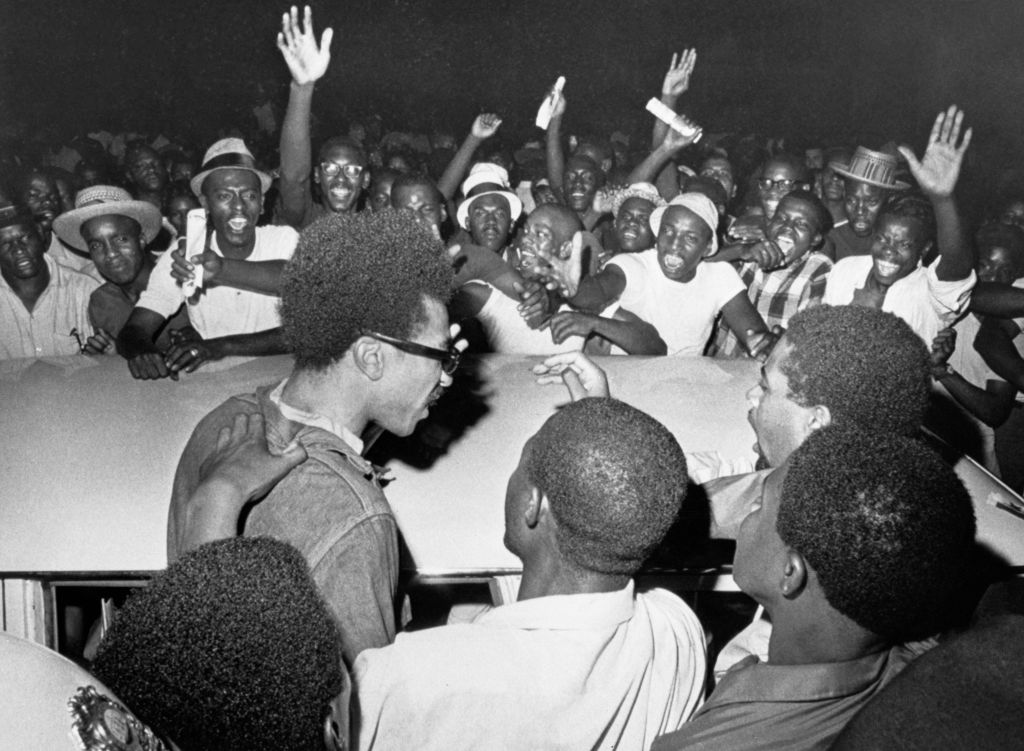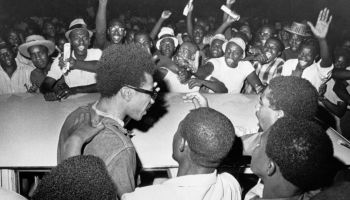
Source: Bettmann / Getty
Sundiata Acoli, 84, has been incarcerated for close to 50 years. Imam Jamil Abdullah Al-Amin, formerly known as H. Rap Brown, has been incarcerated for 21 years. Both elder organizers and former Black Panthers have aged in a system that has a poor reputation for caring for sick and older adults.
In his effort to get parole and release, Acoli even has the support of some Black police groups. A recent NPR report explained that Acoli has been eligible for parole since 1993 and was almost granted parole in 2016. According to the report, four Black police groups submitted a brief citing the low potential for recidivism due to his age and health.
Citing racial bias in sentencing, the groups also pointed to the parole board’s focus on punishing Acoli, which is outside the scope of its function, instead of evaluating evidence that he was unlikely to commit a future crime. His sentence involves the same incident that led to Assata Shakur’s incarceration and exile. Like Shakur, Acoli has maintained that he was shot and not responsible for the death of the New Jersey officer.
In Al-Amin’s case, he has maintained his innocence in a shootout with police in Atlanta. Al-Amin and supporters maintain numerous discrepancies in his case, along with a confession from someone who matched eyewitness reports of the shooter. He is seeking a retrial.
Al-Amin replaced Kwame Ture, formerly Stockley Carmichael, as SNCC chair in 1967. He later went on to become a leader within the Black Panther Party. Al-Amin was also a part of a small group of Muslims who founded the Community Masjid in the West End in Atlanta, where he served as the community’s first imam.
Both cases saw increased attention during Black August, but they cannot wait until the next commemorative period. Described as a time for Black power building and celebrating Black freedom fighters past and present, Black August is a catalyst for deepening political awareness and action.
In the middle of a pandemic, elders like Acoli and Al-Amin remain incarcerated, facing serious medical conditions stressed by poor prison conditions. And while Black August has ended, some say the persisting brutality of the carceral system requires sustained engagement to end the unjust system and free political prisoners like Acoli and Al-Amin.
Compounding matters, it’s costly to incarcerate older adults. According to Senior Matters, it costs taxpayers approximately $16 billion to incarcerate 265,000 older adults.
Dr. Amara Enyia, says the month’s end doesn’t mean the awareness and cultivating taking place during the month should stop. Operating from an abolitionist framework, Enyia said authorities should release the elder political prisoners.
“When we think about someone like Sundiata, 84 years old, in prison since 36-years-old, in prison for nearly 50 years,” shared Enyia. “These are individuals who, obviously at 84, posing no threat to society.”
She said that pushing for their release also stems from an understanding of “how the carceral state has worked against the interests of Black people.”
“We can go back to COINTELPRO; we can go back to 1919,” continued Enyia. “Look at how the state has used surveillance and police and policing to target black people and to especially target those black people who dared to speak up about injustice. And so, this is something that we definitely have to keep in mind when we talk about release.”
Two weeks ago, the Movement for Black Lives released a damning report documenting federal targeting of Black activists during protests last year. Reviewing over 300 criminal cases between August 2020 and October 2020, the organization found federal penalties were harsher in 88% of cases.
A generation of Black people fighting for liberation have been confined to the system; the Movement for Black Lives seeks to break the cycle of suppressing Black dissent in the fighting for Black liberation. Enyia explained that in many of the cases reviewed, the federal government intervened in matters that state and local authorities could handle.
“When the federal government steps in, that means that the charges are higher, the penalties are harsher,” explained Enyia.
Some may say, ‘well, that was a different administration, with a different agenda.’ But Enyia said the persecution of people engaging in the right to protect demands action.
“This is quite dangerous,” Enyia continued. “It’s designed to dissuade Black people from speaking up about injustice and from engaging in protests, civil disobedience.”
Part of preventing such actions from happening in the future requires affirmative action such as passing the BREATHE Act, dismantling the FBI’s Joint Terrorism Task Forces, and amnesty for all recognized political prisoners. Enyia says it is also important to engage people in communities through conversations and teach-ins to have a grounding in what is at stake and what role they can plan in shifting things for the better.
“Everything we have now is the status quo,” she continued. “All of these things that we’re talking about are the results of the status quo. And we’re simply saying the status quo doesn’t work. That if we want to actually address violence, address poverty, we have to invest in all of these other things that we know create strong individuals, strong families, strong communities. That’s the basis of the B Act. It is an invest divest framework.”
See Also:
Cops Are Using Shady Algorithms That Barely Work To Lock Up Innocent Black Folks
Black August Is Over, But The Fight For Black Liberation Continues was originally published on newsone.com
















